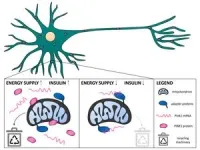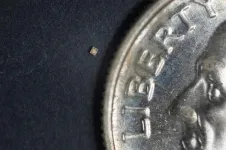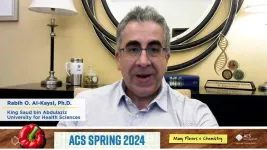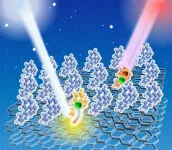(Press-News.org) The hormone insulin controls many cellular processes and adapts them to the body’s current energy supply. One of the insulin-regulated processes is the quality control of cellular power plants in neurons, Angelika Harbauer and her team at the Max Planck Institute for Biological Intelligence discovered. When sufficient energy is available in the body, insulin facilitates the elimination of defective mitochondria. When energy is scarce or when the insulin signal is interrupted, mitochondrial recycling is reduced and cells continue to use their old power plants, even potentially damaged ones. The continued operation of faulty mitochondria could affect ageing processes and neurological diseases.
Nerve cells place special demands on their energy supply. Due to their extensive branching and their high energy needs, they keep a close watch on their cellular power plants, the mitochondria. The cells have to ensure that there are always sufficient mitochondria available in their long extensions, the axons, where the power plants fuel the cell’s communication with its neighboring cells. This is why neurons transport mitochondria even to the cells’ most remote locations.
Angelika Harbauer’s earlier research had shown that mitochondria carry along the blueprints of the PINK1 protein on their journey through the neuron. “PINK1 is a key protein that acts when mitochondria need to be removed because they are no longer functioning correctly,” explains the Max Planck research group leader. “It can mark mitochondria for recycling and is precisely controlled by the cells.” A failure to keep PINK1 in check could lead to a shortage of mitochondria, whereas the continued operation of defective cellular power plants can damage a cell.
A hormone with many roles
Angelika Harbauer and her team now uncovered that the hormone insulin is involved in mitochondrial quality control in neurons. Insulin is well-known for its role in regulating a cell’s sugar uptake. It also controls many processes inside cells to precisely adjust them to the body’s current energy supply.
In the case of mitochondrial recycling, this works as follows: If sufficient energy is available, a signal is transmitted from the insulin receptor on the cell surface to the mitochondria. Here, PINK1 blueprints are stored as mRNA molecules. When the insulin signal arrives, the blueprints are released by the mitochondria and the cell can produce additional PINK1 protein. This ensures that defective mitochondria are efficiently eliminated. In case of an energy shortage, or if the insulin receptor signal is missing, the blueprints for PINK1 remain tightly bound to the mitochondria.
On the one hand, the tight binding to mitochondria allows the PINK1 blueprints to hitchhike far into the nerve cells’ long extensions. On the other hand, it reduces the availability of mRNA molecules for PINK1 production. PINK1 protein levels remain low and mitochondrial recycling is reduced – even though this can lead to the continued operation of damaged power plants.
“We had expected that the binding of the mRNA to the mitochondria would promote PINK1 production,” says Tabitha Hees, lead author of the study. “Surprisingly, our experiments showed that this is not the case. When energy levels are low, it is apparently more favorable for the cells to produce less PINK1 protein and to continue using potentially damaged mitochondria.”
Interrupted signaling with implications for health and ageing
A similar situation can occur when the transmission of signals from the insulin receptor to mitochondria is disturbed due to disease. Defective insulin signaling is a hallmark of diabetes and has also been observed in the brain in connection with Alzheimer's disease. It is also known that inefficient mitochondrial quality control can contribute to various neurodegenerative diseases. “Our observations add to our understanding of how cellular energy supply, ageing and neurodegenerative diseases are interrelated,” says Angelika Harbauer.
Next, the researchers aim to investigate what happens to the PINK1 blueprints once they are released from the mitochondria into the cell. “We are particularly interested in finding out where the PINK1 protein is made, if not at mitochondria, and how it afterwards finds its way back to mitochondria,” says Tabitha Hees. Only when these two steps are taken care of, PINK1 will initiate the recycling of faulty power plants to prevent them from damaging the nerve cell.
END
Insulin affects the recycling of cellular power plants
In nerve cells, the hormone regulates whether mitochondria are shut down or kept running
2024-03-19
ELSE PRESS RELEASES FROM THIS DATE:
Brown researchers develop brain-inspired wireless system to gather data from salt-sized sensors
2024-03-19
PROVIDENCE, R.I. [Brown University] — Tiny chips may equal a big breakthrough for a team of scientists led by Brown University engineers.
Writing in Nature Electronics, the research team describes a novel approach for a wireless communication network that can efficiently transmit, receive and decode data from thousands of microelectronic chips that are each no larger than a grain of salt.
The sensor network is designed so the chips can be implanted into the body or integrated into wearable devices. Each submillimeter-sized silicon sensor mimics ...
New research highlights strong demand for data on personalized risk of preeclampsia
2024-03-19
South San Francisco, Calif. (March 19, 2024) - A new study in BMC Pregnancy and Childbirth finds that objective information about risk of preeclampsia could be key to driving patient behavior change and creates motivation among pregnant patients to follow provider recommendations on prevention, even among those who are medication-hesitant.
Key findings include:
91% of the study participants desired predictive testing for preeclampsia
94% reported they would want blood pressure monitoring at home if found to be at high risk
88% reported they would be more motivated to follow their provider’s medication recommendations if at high risk. This finding was consistent ...
Toxic metal particles can be present in cannabis vapes even before the first use
2024-03-19
NEW ORLEANS, March 19, 2024 — Vapes have often been heralded as a “safer” way to consume either nicotine or cannabis, where legal to do so. But the devices present their own suite of risks that are slowly being revealed as they undergo increasing research and regulation. Now, researchers have discovered that nano-sized toxic metal particles may be present in cannabis vaping liquids even before the vaping device is heated, and the effect is worse in unregulated products.
The researchers will present their results today at the spring meeting of the American Chemical Society (ACS). ACS Spring 2024 is a hybrid meeting being held virtually and in person March ...
Is food waste the key to sustainable, plastic-free diapers and sanitary pads?
2024-03-19
NEW ORLEANS, March 19, 2024 — Once thrown away, disposable items such as diapers and sanitary pads can take hundreds of years to decompose, because their absorbent parts and waterproof layers contain plastics and other synthetic polymers. But now, researchers are replacing these materials with porous components made from protein biomass that is often discarded by the food and agricultural industries. These components are sustainable and biodegradable, and could potentially allow future diapers and sanitary pads to be flushed down a toilet or used as ...
Molecular crystal motors move like microbes when exposed to light
2024-03-19
NEW ORLEANS, March 19, 2024 — At first glance, Rabih O. Al-Kaysi’s molecular motors look like the microscopic worms you’d see in a drop of pond water. But these wriggling ribbons are not alive; they’re devices made from crystallized molecules that perform coordinated movements when exposed to light. With continued development, Al-Kaysi and colleagues say, their tiny machines could be used by physicians as drug-delivery robots or engineered into arrays that direct the flow of water around submarines.
The ...
Conversations in an MR scanner provides a novel view of the brain’s language network
2024-03-19
Researchers have revealed new insights into how the brain processes speech and listening during conversations through advanced investigations using functional magnetic resonance imaging (fMRI). In a groundbreaking study published in the esteemed journal Cerebral Cortex, researchers compared brain activity in individuals while both speaking and listening during natural conversational situations.
Conversational interactions are central to the everyday human experience. During conversation, we use language, together with social, and other cognitive skills to flexibly switch between the roles of speaker and listener. In research on ...
When words make you sick
2024-03-19
In a new book, experts in a variety of fields explore nocebo effects – how negative expectations concerning health can make a person sick. It is the first time a book has been written on this subject.
“I think it’s the idea that words really matter. It’s fascinating that how we communicate can affect the outcome. Communication in health care is perhaps more important than the patient recognises,” says Charlotte Blease, who is a researcher at the Department of Women’s and Children’s Health ...
Removal of incorrect penicillin allergy labels by non-specialist healthcare professional feasible
2024-03-19
Patients who may have been mis-labelled as allergic to penicillin could be safely offered a dose of the oral antibiotic to demonstrate that they could take it without harm, following a new trial.
In a new study published in the Journal of Infection funded by the National Institute for Health and Care Research (NIHR), academics and clinicians ran a study in three UK hospitals to assess the feasibility of non-allergy specialist healthcare professionals delivering direct oral penicillin ‘challenges’, without doing allergy tests, where low risk patients ...
Is your partner’s disturbed sleep keeping you up at night? Letting go of unattainable dreams may keep you both happy in bed
2024-03-19
We all know that getting a good night’s sleep is vital for physical and mental health. Yet many people share a bed with a partner who can’t help disturb their sleep. For example through their insomnia, frequently going to the bathroom, snoring, or a tendency to toss and turn in bed. Unsurprisingly, research has shown that poor sleep can lead to increased anger and decreased satisfaction with the relationship. But can we avoid falling in this trap, short of sleeping in separate bedrooms?
Yes, if we are naturally good – or learn to be so – at goal disengagement, the mental ...
Molecular orientation is key: shining new light on electron behavior using 2-photon photoemission spectroscopy
2024-03-19
Osaka, Japan – Organic electronics is a field that has garnered significant interest in academic and industrial circles due to its potential applications in OLEDs and organic solar cells, offering advantages such as lightweight design, flexibility, and cost-efficiency. These devices are made by depositing a thin film of organic molecules onto a substrate that acts as an electrode, and function by controlling the transfer of electrons between the thin film and the substrate. Therefore, understanding electron behavior at the interface between the substrate ...
LAST 30 PRESS RELEASES:
Microbe exposure may not protect against developing allergic disease
Forest damage in Europe to rise by around 20% by 2100 even if warming is limited to 2°C
Rapid population growth helped koala’s recovery from severe genetic bottleneck
CAR-expressing astrocytes target and clear amyloid-β in mouse model of Alzheimer’s disease
Unique Rubisco subunit boosts carbon assimilation in land plants
Climate change will drive increasing forest disturbances across Europe throughout the next century
Enhanced brain cells clear away dementia-related proteins
This odd little plant could help turbocharge crop yields
Flipped chromosomal segments drive natural selection
Whole-genome study of koalas transforms how we understand genetic risk in endangered species
Worcester Polytechnic Institute identifies new tool for predicting Alzheimer’s disease
HSS studies highlight advantages of osseointegration for people with an amputation
Buck Institute launches Healthspan Horizons to turn long-term health data into Actionable healthspan insights
University of Ottawa Heart Institute, the University of Ottawa and McGill University launch ARCHIMEDES to advance health research in Canada
The world’s largest brain research prize awarded for groundbreaking discoveries on how we sense touch and pain
Magnetofluids help to overcome challenges in left atrial appendage occlusion
Brain-clearing cells offer clues to slowing Alzheimer’s disease progression
mRNA therapy restores fertility in genetically infertile mice
Cloaked stem cells evade immune rejection in mice, pointing to a potential universal donor cell line
Growth in telemedicine has not improved mental health care access in rural areas, study finds
Pitt scientists engineer “living eye drop” to support corneal healing
Outcomes of older adults with advanced cancer who prefer quality of life vs prolonging survival
Lower music volume levels in fitness class and perceived exercise intensity
Of crocodiles, counting and conferences
AERA announces 2026 award winners in education research
Saving two lives with one fruit drop
Photonic chips advance real-time learning in spiking neural systems
Share of migratory wild animal species with declining populations despite UN treaty protections worsens from 44% to 49% in two years; 24% face extinction, up 2%
One in 20 babies experiences physical abuse, global review finds
Tundra tongue: The science behind a very cold mistake
[Press-News.org] Insulin affects the recycling of cellular power plantsIn nerve cells, the hormone regulates whether mitochondria are shut down or kept running







